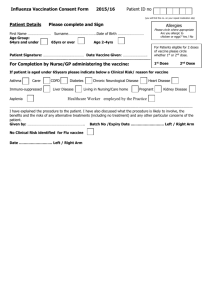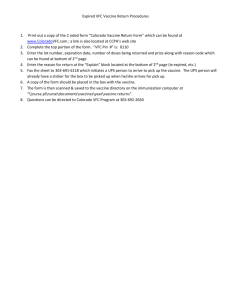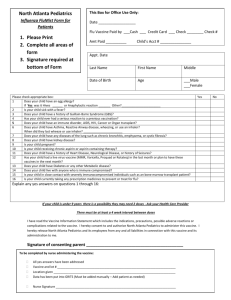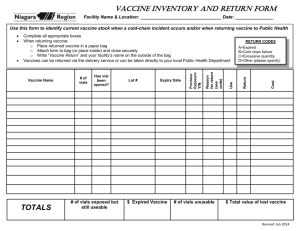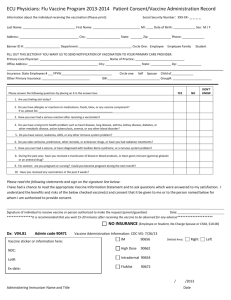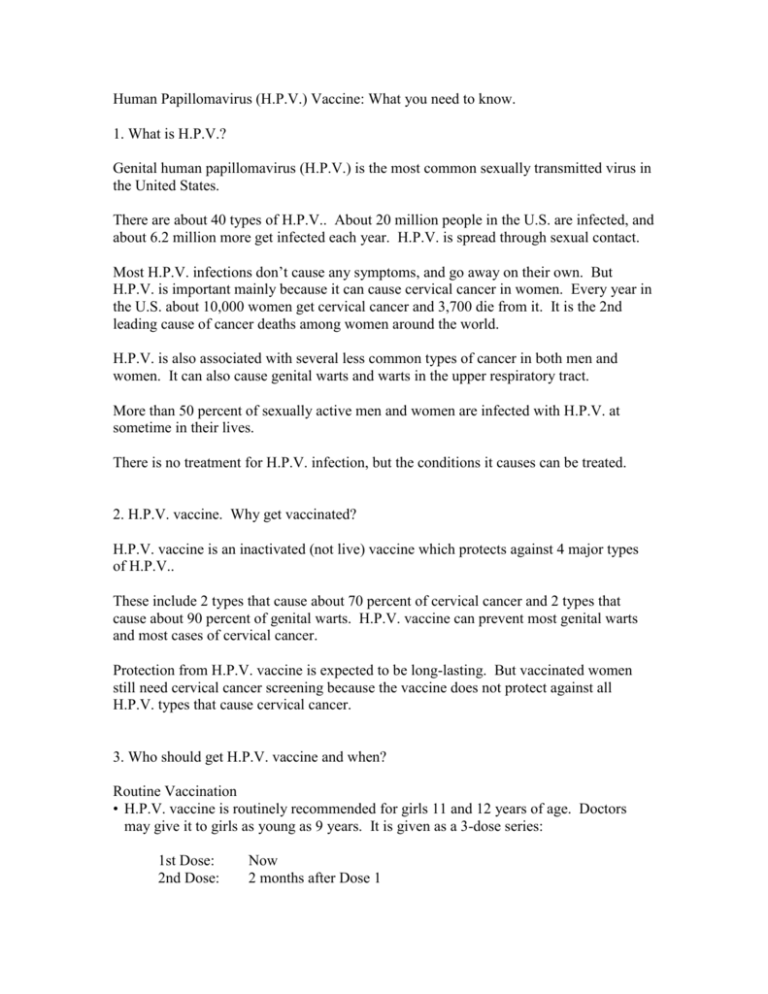
Human Papillomavirus (H.P.V.) Vaccine: What you need to know.
1. What is H.P.V.?
Genital human papillomavirus (H.P.V.) is the most common sexually transmitted virus in
the United States.
There are about 40 types of H.P.V.. About 20 million people in the U.S. are infected, and
about 6.2 million more get infected each year. H.P.V. is spread through sexual contact.
Most H.P.V. infections don’t cause any symptoms, and go away on their own. But
H.P.V. is important mainly because it can cause cervical cancer in women. Every year in
the U.S. about 10,000 women get cervical cancer and 3,700 die from it. It is the 2nd
leading cause of cancer deaths among women around the world.
H.P.V. is also associated with several less common types of cancer in both men and
women. It can also cause genital warts and warts in the upper respiratory tract.
More than 50 percent of sexually active men and women are infected with H.P.V. at
sometime in their lives.
There is no treatment for H.P.V. infection, but the conditions it causes can be treated.
2. H.P.V. vaccine. Why get vaccinated?
H.P.V. vaccine is an inactivated (not live) vaccine which protects against 4 major types
of H.P.V..
These include 2 types that cause about 70 percent of cervical cancer and 2 types that
cause about 90 percent of genital warts. H.P.V. vaccine can prevent most genital warts
and most cases of cervical cancer.
Protection from H.P.V. vaccine is expected to be long-lasting. But vaccinated women
still need cervical cancer screening because the vaccine does not protect against all
H.P.V. types that cause cervical cancer.
3. Who should get H.P.V. vaccine and when?
Routine Vaccination
• H.P.V. vaccine is routinely recommended for girls 11 and 12 years of age. Doctors
may give it to girls as young as 9 years. It is given as a 3-dose series:
1st Dose:
2nd Dose:
Now
2 months after Dose 1
3rd Dose:
6 months after Dose 1
Why is H.P.V. vaccine given to girls at this age?
It is important for girls to get H.P.V. vaccine before their first sexual contact – because
they have not been exposed to H.P.V.. For these girls, the vaccine can prevent almost
100 percent of disease caused by the 4 types of H.P.V. targeted by the vaccine.
However, if a girl or woman is already infected with a type of H.P.V., the vaccine will
not prevent disease from that type.
Catch-Up Vaccination
• The vaccine is also recommended for girls and women 13 through 26 years of age who
did not receive it when they were younger.
No booster doses are recommended at this time.
H.P.V. vaccine may be given at the same time as other vaccines.
4. Some girls or women should not get H.P.V. vaccine or should wait.
• Anyone who has ever had a life-threatening allergic reaction to yeast, to any other
component of H.P.V. vaccine, or to a previous dose of H.P.V. vaccine should not get
the vaccine. Tell your doctor if the person getting the vaccine has any severe allergies.
• Pregnant women should not get the vaccine. The vaccine appears to be safe for both the
mother and the unborn baby, but it is still being studied. Receiving H.P.V. vaccine
when pregnant is not a reason to consider terminating the pregnancy. Women who are
breast feeding may safely get the vaccine.
Any woman who learns that she was pregnant when she got H.P.V. vaccine is
encouraged to call the H.P.V. vaccine in pregnancy registry at 800-986-8999.
Information from this registry will help us learn how pregnant women respond to the
vaccine.
• People who are mildly ill when the shot is scheduled can still get H.P.V. vaccine.
People with moderate or severe illnesses should wait until they recover.
5. What are the risks from H.P.V. vaccine?
H.P.V. vaccine does not appear to cause any serious side effects.
However, a vaccine, like any medicine, could possibly cause serious problems, such as
severe allergic reactions. The risk of any vaccine causing serious harm, or death, is
extremely small.
Several mild problems may occur with H.P.V. vaccine:
• Pain at the injection site (about 8 people in 10)
• Redness or swelling at the injection site (about 1 person in 4)
• Mild fever (100 degrees Fahrenheit) (about 1 person in 10)
• Itching at the injection site (about 1 person in 30)
• Moderate fever (102 degrees Fahrenheit) (about 1 person in 65)
These symptoms do not last long and go away on their own.
Life-threatening allergic reactions from vaccines are very rare. If they do occur, it would
be within a few minutes to a few hours after the vaccination.
Like all vaccines, H.P.V. vaccine will continue to be monitored for unusual or severe
problems.
6. What if there is a severe reaction?
What should I look for?
• Any unusual condition, such as a high fever or behavior changes. Signs of a serious
allergic reaction can include difficulty breathing, hoarseness or wheezing, hives,
paleness, weakness, a fast heart beat or dizziness.
What should I do?
• Call a doctor, or get the person to a doctor right away.
• Tell your doctor what happened, the date and time it happened, and when the
vaccination was given.
• Ask your doctor, nurse, or health department to report the reaction by filing a Vaccine
Adverse Event Reporting System (VAERS) form.
Or you can file this report through the VAERS website at w.w.w. dot v.a.e.r.s. dot h.h.s.
dot g.o.v., or by calling 1-800-822-7967.
VAERS does not provide medical advice.
7. How can I learn more?
• Ask your doctor or nurse. They can show you the vaccine package insert or suggest
other sources of information.
• Call your local or state health department.
• Contact the Centers for Disease Control and Prevention (C.D.C.):
Call 1-800-232-4636 (1-800-C.D.C. I.N.F.O.)
Visit C.D.C.’s website at w.w.w. dot c.d.c. dot g.o.v. slash s.t.d. slash
h.p.v. and w.w.w. dot c.d.c. dot g.o.v. slash n.i.p.
Department of Health and Human Services
Centers for Disease Control and Prevention
National Center for Immunization and Respiratory Diseases
Vaccine Information Statement (Interim)
Human Papillomavirus (H.P.V.) Vaccine
9/5/06

